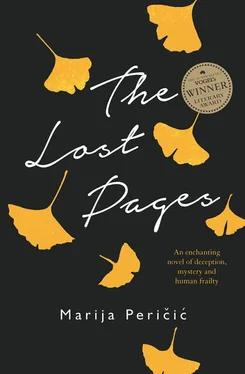Anja’s continued absence obsessed me. I searched for her everywhere. I walked through the halls of the university, hoping to run into her, but the campus was closed for the summer and the empty corridors echoed with my lonely footfalls. I lingered in the cafés, museums and parks that we had visited together, waiting for her to appear, but she never did. Her ghost began to haunt me, appearing all over the city. I would constantly see girls with hair of exactly the same hue or with the same supple figure walking down the street or waiting at shop counters, and the sight of them would stop my heart. I would hurry along the street, or open the door of the shop, my heart racing, but the girl would disappear or turn her head to reveal that she did not resemble Anja in the slightest.
I asked everyone I knew where she and her family had gone, but no one could tell me, or they gave me contradictory information about the summer-holiday destinations of the family. They were in Vienna or Paris or Berlin, or they had seen Anja yesterday, trying on hats in a shop in the Little Quarter. When I lay in bed at night I began to have paranoid thoughts that she was with Franz, in Karlsbad or in some other place. I pictured the two of them sharing our little Karlsbad hotel room. This would drive me into such a frenzy that I would be ready to leap up and return there by the next train. Consumed by jealousy, I wavered between intense feelings of love and hatred for Anja. I continued to write to her, despite my awareness that the letters would not find her and would instead be collected by the impatient hands of the concierge. It occurred to me that if Franz was also writing to her, at least he was in the same situation as me. As sad as it was, the thought cheered me immensely.
AFTER I HAD SENT MY DRAFT TO THEODOR, SCHOPENHAUER AND the book completely left my mind; and a tranquillity settled over me. A few weeks later, however, my manuscript returned to me once again, its pages disfigured by crossings-out, question marks and notes that were scrawled in every margin. I was given a month to set it to rights, and for the whole of that month I rued the day I had conceived of my exalted notions of an avant-garde philosophical novel.
Usually after a time away from a piece of writing, even one with which I had been fatigued, I had always returned refreshed, with new eyes that could see the flaws but also appreciate the merits of that writing. But this was totally demoralising. There was nothing of much merit that I could see. The pace limped along, no matter how I laboured, scenes followed each other in a confusing order and even I was bored by my own voice. I worked and reorganised and deleted and expanded up until the last day, and then sent it on its way. I was expecting more challenges from Theodor and requests to rewrite it, but I had the sense that he had given up on me, and the book went to print without other changes. I cannot say whether I was relieved or saddened by this.
While I was waiting for the book to come out, I tried to reassure myself that it was not as bad as it seemed, and perhaps some deep part of me believed this and even felt confident of the book’s brilliance, because its trajectory came as an extreme disappointment. The week that it was due for release I eagerly watched the usual newspapers and journals for reviews, but nothing appeared. The day of the release came and went, and still the papers were silent. Surely, I felt, there had been some mistake. I furtively made a round of the bookshops and saw the book lying in all its printed glory in the ‘new release’ sections in the windows, but I never saw any browsing bookshop customer take up a copy.
Another week went past, and at last some reviews appeared. One was a critical piece in Der Neue Weg by that turncoat Franz Werfel, who labelled the book ‘a compendium of mediocre twaddle, clearly the product of a confused mind’. The same day there was another more neutral piece in the Bohemia , which commended the work on its meticulous research but concluded that it was an ‘essentially soulless work’, far inferior to Nornepygge . Apart from these two reviews, as far as I could see the novel was completely ignored. The sales were dismal. The book was moved to the regular shelves, and then away out of sight.
I could almost have laughed to think that I had devised this project as my great masterpiece, a work that would fix my place in the galaxy of literary intellectuals. I could not bring myself to look at it again; it was far too painful.
I tried not to dwell too much upon it. Although at that time I wished never to have to write another word, unfortunately I still had the travelogue to contend with. I had expected Franz to contribute to this, but having heard nothing from him I set about writing it up myself.
While I was sifting through the notes from Karlsbad, I pulled out a crumpled envelope with Franz’s name upon it. At first I thought that it might be a letter from Anja, and my heart tightened, but the envelope was too thin to be a letter. I opened it and saw that it was the cheque that Theodor had asked me to pass on to Franz. It was for an odd sum, not a rounded figure, and I thought that it might be some kind of reimbursement. It was also not made out to Franz in name, but to cash. It was quite a large sum: three hundred and fifty-three crowns and twenty-two heller.
There was no note or letter that might give any clue as to the reason for the payment. It certainly was a bit of money. I could have done with such a windfall. I put the cheque away and tried not to think about it. But, in the next days, my thoughts kept returning to it. It was so much money. It was most likely, I thought, that the cheque was for expenses incurred, or expected expenses, in Karlsbad. If that were the case, I reasoned, then I was entitled to at least a part of that sum. Most of it in fact. After all, I had been the one who had done almost all the work while we were there; I had been the one to pay for countless museums and tours of historical sites, and now here I was writing the thing up too. The more I thought about it, the more it seemed fair that I should keep a part of it. After a few more days of piecing together the travelogue, I had convinced myself that actually I deserved the whole sum. Probably, I told myself, this was what Theodor had intended by making the cheque to cash in any case. And besides, my finances were quite severely drained what with Karlsbad and the money I had spent on Gustav and Alexandr. I cashed the cheque and did not feel the tiniest bit of guilt.
THE HEAT OF THE CITY WAS BECOMING UNCOMFORTABLE AND I fell into the usual state of depression that dogged me each summer. A heightened awareness of my body added to the dark thread of unhappiness that ran through my days. I shrank into myself and kept busy with my work at the post office.
In the mornings on the way to work I would stand on the tram and sweat into my padded jacket, too ashamed to remove it in public. I tried to ignore the looks thrown at me as I stood there with sweat running down my face and the imprint of my hand darkening the leather handles. I would smell the odour of the damp jacket, so often worn, gradually steeping the air around my seat, and I always tried to secure the place closest to the window to spare my fellow passengers.
On the hottest days I would forgo the tram, and instead walk the distance to the office. I would leave my house very early in the morning, just after it was light, at a time when the city was still waking for the day. Remnants of night-time mist clung to the sides of buildings, waiting to be burned up by the sun. The sky was stretched white over the rooftops and I breathed the stagnant air that was like a layer of damp cotton.
Читать дальше












